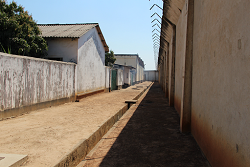January 2013
- Posting by PRAWA
- Zambia
 A lot of prisons in Africa were inherited from the colonial era where the prison environment was established is with the intention of punishment, deterrence, and incapacitation. As the world moves towards the use of prisons for rehabilitative purposes, the architecture of these institutions are expected to reflect this. Prison architecture has to encompass far more than the mere idea of punishment, but rather should also include consideration of the security, health and living conditions of inmates and officers alike.
A lot of prisons in Africa were inherited from the colonial era where the prison environment was established is with the intention of punishment, deterrence, and incapacitation. As the world moves towards the use of prisons for rehabilitative purposes, the architecture of these institutions are expected to reflect this. Prison architecture has to encompass far more than the mere idea of punishment, but rather should also include consideration of the security, health and living conditions of inmates and officers alike.
An effective prison is one built with surroundings that provide the setting for human activity geared towards inmate rehabilitation. A typical example of an innovative way of using prisons architecture as an encouraging tool in inmate rehabilitation is the use of Parameter walls in the Maximum Security Prison located in the central area of Zambia.
The major challenge within Maximum security prisons is maintaining order and security, this need usually results in the reduction of the number of hours that inmates are allowed outside their cells. The parameter walls, on the other hand, allow the prison management to effectively manage the inmate population while providing them with shorter lock up periods and allowing them work in the workshop regardless of the security risk.
In the Maximum Security Prison in Zambia, prisoners considered to be in the ‘special stage’, considered to be honored inmates, are released at 5:30am while every other prisoner is released at 6:00am by 12:30 pm there is the mid-day lock up in order to prepare for the handover of the duty officers in the A Shift to those in the B shift. After the handover the prisoners are released once again until the final lock up by 4:30pm. In general these prisoners at a maximum security have to opportunity of having shorter lock-up hours which range from about 9 to 10 hours in a day.
